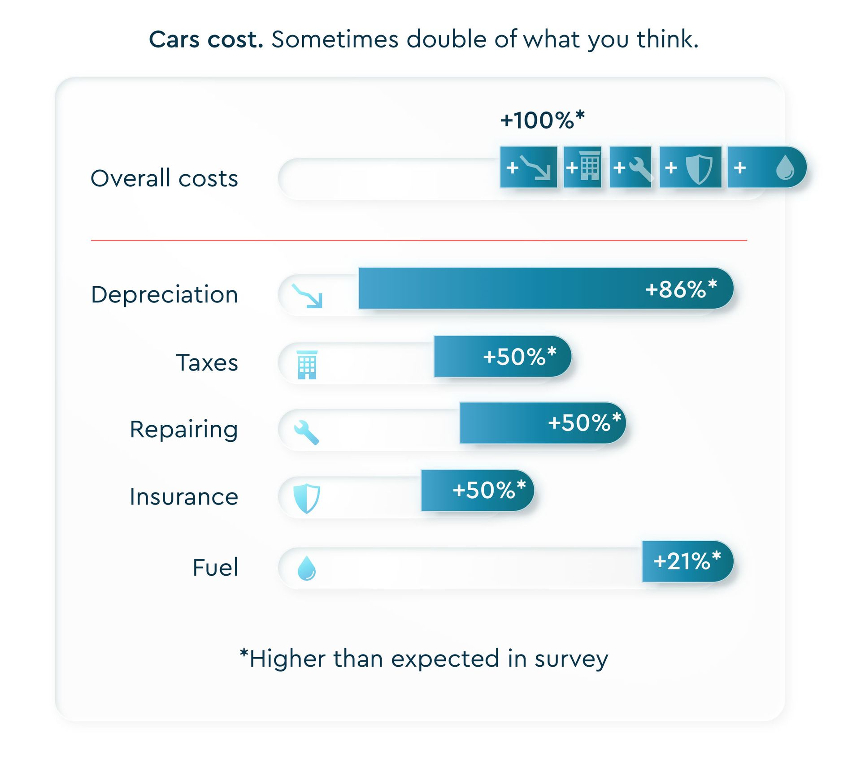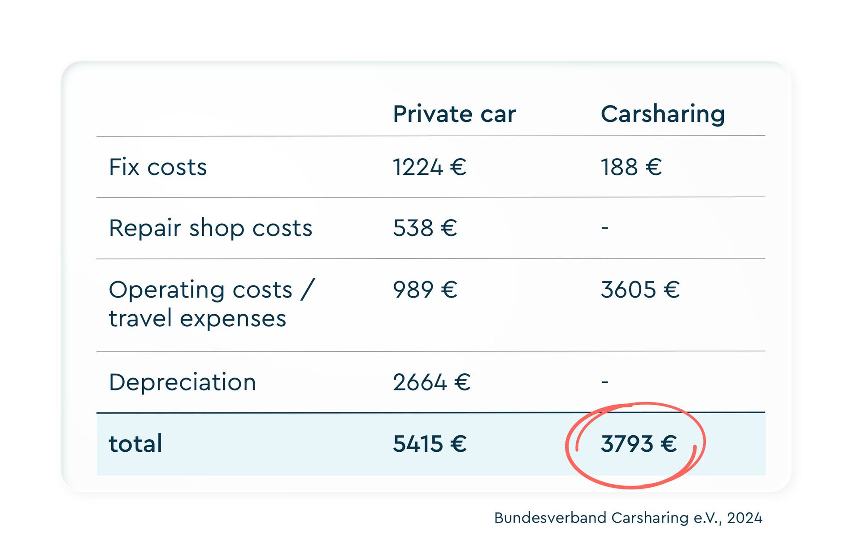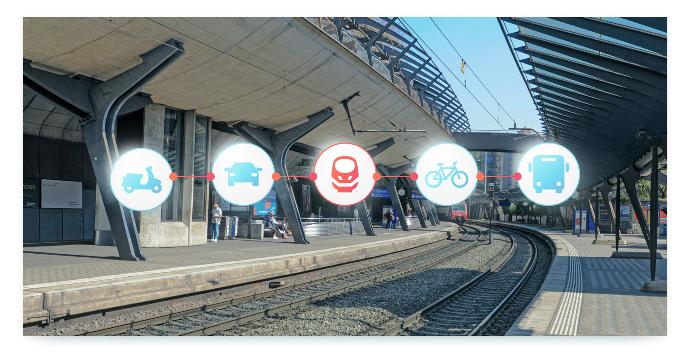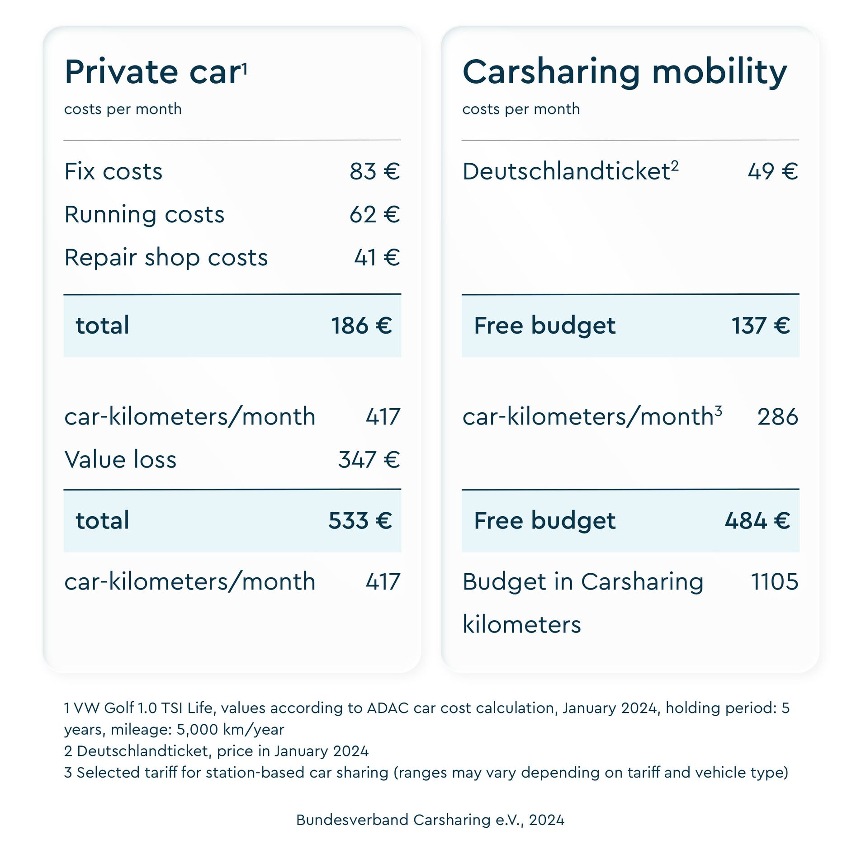If you compare the cost of a single carsharing trip with the actual fuel costs incurred, you might think that sharing is pretty expensive. But the comparison is flawed - as it does not take into account all the cost factors of a car. In fact, the majority of drivers would save money through carsharing - and city dwellers, the climate and the environment would also benefit.
In Germany, cars are parked on average more than 23 hours a day. So it doesn't really make sense that almost every household has its own car (or even several). But what still stops many people from switching to alternative solutions and sharing a car with several people are false assumptions about the costs. In many cases, carsharing is cheaper than car ownership.
Many people do not realistically estimate the cost of a car
On average, a private car costs around twice as much as owners believe. At least that is the result of a study conducted by the RWI - Leibniz Institute for Economic Research, the University of Mannheim and Yale University in 2018. The approximately 6,000 respondents stated average monthly costs of 204 euros, while the real expenses averaged 425 euros per month. The study leaders used ADAC price tables to calculate the actual costs.
In addition to fuel, the total costs also include fixed costs such as insurance, taxes, depreciation and costs for repairs and maintenance. The respondents estimated the loss of value to be particularly low. This is around 86% higher than expected. The actual costs for repairs, taxes and insurance are around 50% higher than calculated in the study. Only fuel costs were estimated somewhat realistically - here the actual costs were "only" 21% higher than assumed.

According to ADAC calculations, a large BMW SUV costs a good 1,586 euros per month or 127 cents per kilometer (assuming a 5-year ownership period and 15,000 kilometers per year). The cost of a smaller VW Golf (diesel) is 554 euros per month or 44 cents per kilometer.
If you are aware of these actual expenses, you can put the prices for carsharing into a realistic perspective. Because if you only look at the fees for a single journey, carsharing appears much more expensive than it actually is. However, if you take into account all the running costs of owning your own car, a different picture emerges compared to carsharing costs.
Carsharing is worthwhile up to 14,000 kilometers per year
The Bundesverband CarSharing e.V. (bcs) recently calculated for whom carsharing is financially worthwhile. The result: Up to an annual mileage of 14,000 kilometers or 1,150 kilometers per month, carsharing is cheaper than owning a car.
For this calculation, the bcs compared the total costs of an inexpensive small car with average carsharing tariffs including a monthly basic fee and a low deductible in the event of damage.
This also means that the savings from carsharing are even higher for larger cars. On the other hand, anyone who uses a used car as a gift and therefore does not have to factor in any loss of value will benefit from carsharing up to approx. 330 kilometers per month or 4,000 kilometers per year.

It is interesting to note that when the bcs carried out the same calculation in 2019, the limit was 10,000 kilometers per year - the reason for this difference is the increased purchase and operating costs of a car, while carsharing costs did not increase to the same extent.
Not all carsharing is the same, of course
But there are also differences in the comparative values, the average costs for carsharing. This is mainly because there is a variety of providers and, accordingly, different tariff systems.
Each provider sets its own time-based rates per minute, hour, day, etc. as well as the prices per kilometer. In addition, some providers offer subscription options where customers can opt for a subscription with a monthly basic fee and lower rental prices, for example.
Reach more customer segments with subscription groups →
In addition, free-floating is generally more expensive than station-based sharing offers. This is also due to the fact that free-floating offers lead to higher operating costs on the part of the providers. Station-based carsharing is therefore particularly competitive with private cars.
In order to arrive at an individually valid calculation, it is therefore necessary to compare your own specific costs for car ownership with the prices for locally available carsharing services.

Time is also a factor
In addition to the financial outlay for your own car, the time factor should also be taken into account for a complete picture.
After all, a car also costs time: It has to be regularly inspected and serviced and as soon as something breaks down, it has to go to the garage for repairs. It also has to be washed and cleaned according to your own requirements.
Carsharing customers don't have to worry about these things, as the sharing provider takes care of everything for their vehicles. They get into a clean, well-maintained car and drive off.
Keeping your sharing vehicles ready for use →
On the other hand, a carsharing vehicle is of course not necessarily right on your doorstep, but must first be picked up. Ideally, however, a service should be within walking distance of your own neighborhood - at least that is the target state that the industry is aiming for in the coming years. Currently, at least every second German city with a population of 20,000 or more already has a carsharing service. That is even the case in more than 90% of large cities with a population of 100,000 or more.

Who else benefits from carsharing
Carsharing is not only worthwhile for individuals as an alternative to owning a car - but also for the general public.
City dwellers
Residents in cities benefit from the space freed up by carsharing: According to the bcs, carsharing ensures that between 5 and 12 private cars are eliminated per shared vehicle. In city centers, one carsharing vehicle even replaces up to 20 private cars. According to calculations by the bcs, between 33,930 (pessimistic scenario) and 209,000 (optimistic scenario) cars have already been eliminated in Germany due to carsharing. The study by RWI, the University of Mannheim and Yale University cited above also comes to the conclusion that 37% of car owners would get rid of their car if they were aware of the actual costs.
Conversely, this means that numerous parking spaces in cities would be freed up. These can then be used for other purposes, for example for cycle paths, seating areas in neighborhoods or public transport stops. Green spaces could also be planted, which would not only increase the feel-good factor in the city, but also have a positive effect on air quality.
Alternatively, parking spaces at ground level can also be reclaimed by building underground parking garages. However, this is more expensive in economic terms. After all, a single parking space costs 15,000 euros. The total cost of relocating as many cars as possible is in the billions.

Environment and climate
The environment and climate also benefit from carsharing. According to a 2017 estimate by the Federal Environment Agency, services that are well connected to public transport save 3,500 tons of CO² per day.
There are many reasons for this: On the one hand, fewer cars will have to be produced in the future if more and more people give up private ownership. On the other hand, the newly freed-up areas that are subsequently greened have a positive effect on the climate.
In addition, the proportion of electrically powered cars in carsharing fleets is significantly higher than in private car fleets. On average, sharing vehicles are more modern, smaller and more energy-efficient.
This is also due to the fact that private cars are often designed for maximum demand. In other words, they have to be big enough for a two-week family vacation in the summer, for example. However, a smaller car would suffice for the majority of the remaining journeys in a year. The rule is: The bigger the car, the more emissions it produces. With sharing, users choose the vehicle that meets their current needs for each journey.
Carsharing with regards to climate change - Sharing for Future? →
The thing about freedom
Although various study results paint a consistent picture that carsharing is worthwhile in several respects, for many people the switch is not quite so easy - even if it were possible thanks to local carsharing coverage.
In many industrialized nations such as Germany, the topic of cars is very emotionally charged. It is (often unconsciously) seen as a symbol of freedom and independence and is also a prestigious object, especially among older generations.
Can carsharing offer the same independence as having your own car? To a certain extent - it depends on what is available locally. It is clear that there are groups that are dependent on a car, such as a family with small children or people in very rural areas.
Does Carsharing work in rural areas? →
There is no guarantee that a shared vehicle will be available when it is needed spontaneously. However, the probability of this is high, at least in large cities, and will continue to grow in the coming years. The more providers and sharing cars there are locally, the greater the feeling of security that is conveyed. As a rule of thumb, a location is considered covered if there is one sharing vehicle per 100-140 people.

In addition, carsharing gives you a completely different kind of freedom - the freedom of choice.
In most cases, anyone who owns a car will also use it to get around. This makes financial sense due to the fixed costs that are incurred anyway. After all, these costs would also be incurred if the car were to stand still.
However, if you don't have your own car, you have a choice before every journey: How do I want to get from A to B today? Perhaps by bike if the sun is shining? By bus and train? Or by carsharing?
The costs saved by not owning a car form your own mobility budget. If you spend this on public transport or sharing services, you will generally still save more than if you owned a car.
To illustrate this, here is a sample calculation carried out by the bcs in 2024:

In addition to the freedom to choose the means of transportation, there is also freedom of choice with regard to the vehicle model - for those cases in which the choice falls on carsharing. Before each trip, users have the option of choosing a model (depending, of course, on the variety of local offers). This not only allows the vehicle size to vary, but also offers the chance to test newer models or electric vehicles.

For many, carsharing is the better solution
The obvious advantage of carsharing is that you only pay for a car when you actually use it. On the other hand, there is the psychological effect that the costs per journey are always visible. Drivers should therefore be aware of the actual costs of their car ownership in order to make a realistic cost comparison.
Carsharing is particularly worthwhile for occasional drivers who cover up to 1,150 kilometers per month - or more if they drive a larger car. This also makes sharing a sensible option for families who want to do without a second car.
Commuters or those who frequently travel long distances by car, on the other hand, often benefit financially more from owning their own car. Unless, of course, they take into account the effects on the general public - because when it comes to quality of life in cities and climate protection, sharing performs significantly better than private car ownership.




